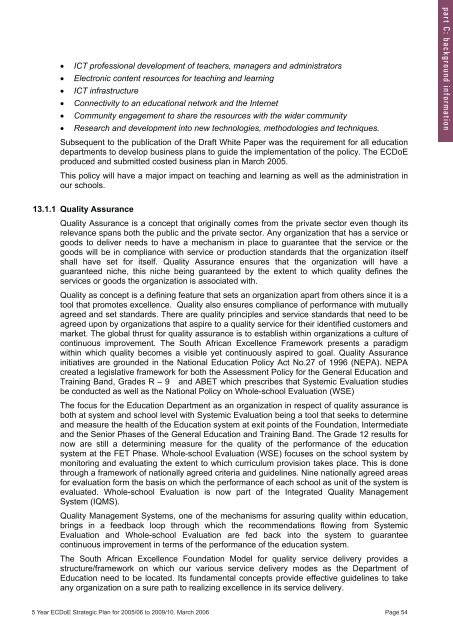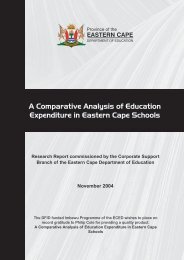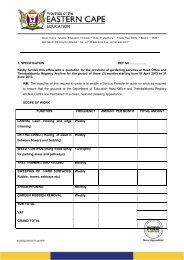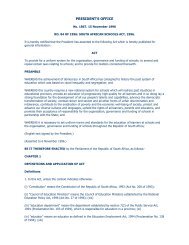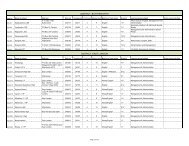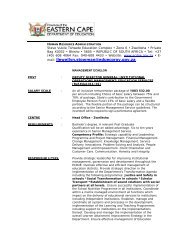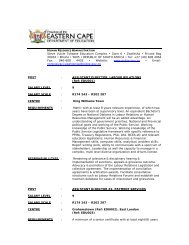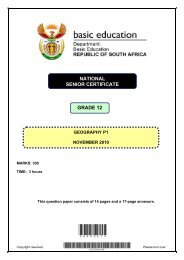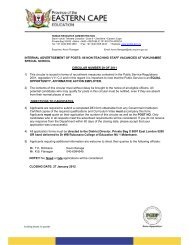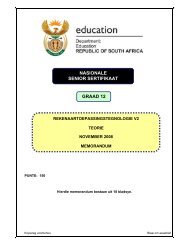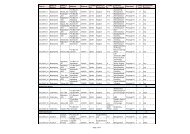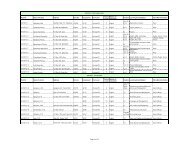5 Year Strategic Plan 2005/06 - Department of Education
5 Year Strategic Plan 2005/06 - Department of Education
5 Year Strategic Plan 2005/06 - Department of Education
Create successful ePaper yourself
Turn your PDF publications into a flip-book with our unique Google optimized e-Paper software.
ICT pr<strong>of</strong>essional development <strong>of</strong> teachers, managers and administrators<br />
Electronic content resources for teaching and learning<br />
ICT infrastructure<br />
Connectivity to an educational network and the Internet<br />
Community engagement to share the resources with the wider community<br />
Research and development into new technologies, methodologies and techniques.<br />
Subsequent to the publication <strong>of</strong> the Draft White Paper was the requirement for all education<br />
departments to develop business plans to guide the implementation <strong>of</strong> the policy. The ECDoE<br />
produced and submitted costed business plan in March <strong>2005</strong>.<br />
This policy will have a major impact on teaching and learning as well as the administration in<br />
our schools.<br />
p a r t C : b a c k g r o u n d i n f o r m a t i o n<br />
13.1.1 Quality Assurance<br />
Quality Assurance is a concept that originally comes from the private sector even though its<br />
relevance spans both the public and the private sector. Any organization that has a service or<br />
goods to deliver needs to have a mechanism in place to guarantee that the service or the<br />
goods will be in compliance with service or production standards that the organization itself<br />
shall have set for itself. Quality Assurance ensures that the organization will have a<br />
guaranteed niche, this niche being guaranteed by the extent to which quality defines the<br />
services or goods the organization is associated with.<br />
Quality as concept is a defining feature that sets an organization apart from others since it is a<br />
tool that promotes excellence. Quality also ensures compliance <strong>of</strong> performance with mutually<br />
agreed and set standards. There are quality principles and service standards that need to be<br />
agreed upon by organizations that aspire to a quality service for their identified customers and<br />
market. The global thrust for quality assurance is to establish within organizations a culture <strong>of</strong><br />
continuous improvement. The South African Excellence Framework presents a paradigm<br />
within which quality becomes a visible yet continuously aspired to goal. Quality Assurance<br />
initiatives are grounded in the National <strong>Education</strong> Policy Act No.27 <strong>of</strong> 1996 (NEPA). NEPA<br />
created a legislative framework for both the Assessment Policy for the General <strong>Education</strong> and<br />
Training Band, Grades R – 9 and ABET which prescribes that Systemic Evaluation studies<br />
be conducted as well as the National Policy on Whole-school Evaluation (WSE)<br />
The focus for the <strong>Education</strong> <strong>Department</strong> as an organization in respect <strong>of</strong> quality assurance is<br />
both at system and school level with Systemic Evaluation being a tool that seeks to determine<br />
and measure the health <strong>of</strong> the <strong>Education</strong> system at exit points <strong>of</strong> the Foundation, Intermediate<br />
and the Senior Phases <strong>of</strong> the General <strong>Education</strong> and Training Band. The Grade 12 results for<br />
now are still a determining measure for the quality <strong>of</strong> the performance <strong>of</strong> the education<br />
system at the FET Phase. Whole-school Evaluation (WSE) focuses on the school system by<br />
monitoring and evaluating the extent to which curriculum provision takes place. This is done<br />
through a framework <strong>of</strong> nationally agreed criteria and guidelines. Nine nationally agreed areas<br />
for evaluation form the basis on which the performance <strong>of</strong> each school as unit <strong>of</strong> the system is<br />
evaluated. Whole-school Evaluation is now part <strong>of</strong> the Integrated Quality Management<br />
System (IQMS).<br />
Quality Management Systems, one <strong>of</strong> the mechanisms for assuring quality within education,<br />
brings in a feedback loop through which the recommendations flowing from Systemic<br />
Evaluation and Whole-school Evaluation are fed back into the system to guarantee<br />
continuous improvement in terms <strong>of</strong> the performance <strong>of</strong> the education system.<br />
The South African Excellence Foundation Model for quality service delivery provides a<br />
structure/framework on which our various service delivery modes as the <strong>Department</strong> <strong>of</strong><br />
<strong>Education</strong> need to be located. Its fundamental concepts provide effective guidelines to take<br />
any organization on a sure path to realizing excellence in its service delivery.<br />
5 <strong>Year</strong> ECDoE <strong>Strategic</strong> <strong>Plan</strong> for <strong>2005</strong>/<strong>06</strong> <strong>2005</strong>-<strong>06</strong> to to 2009/10. 2009-10. March 21 F (3).doc 20<strong>06</strong> Page 54 50


